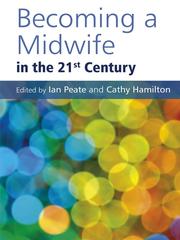| Listing 1 - 4 of 4 |
Sort by
|
Book
ISBN: 9781118410936 Year: 2014 Publisher: Chichester Wiley Blackwell
Abstract | Keywords | Export | Availability | Bookmark
 Loading...
Loading...Choose an application
- Reference Manager
- EndNote
- RefWorks (Direct export to RefWorks)
Now updated to include the latest 2012 NMC Midwifery Rules and Standards and a brand new chapter on the midwife and public health, this comprehensive resource provides a wide range of need-to-know information for student midwives, including:Effective communication and documentationConfidentialityInterdisciplinary workingThe fundamentals of antenatal, intrapartum, and postnatal careAssessment and examination of the new-born babyMedicinesPublic healthClinical decision-makingEvidence-based practice
Midwifery. --- Nurse Midwives --- Perinatal Care --- Vroedkunde --- Vroedvrouwen --- Midwife --- Midwives --- Traditional Birth Attendant --- Birth Attendant, Traditional --- Birth Attendants, Traditional --- Traditional Birth Attendants --- organization & administration. --- standards. --- methods. --- Studenten --- Midwifery --- organization & administration --- standards --- methods --- Vroedvrouw --- Student

ISBN: 9780470065594 Year: 2007 Publisher: Chichester John Wiley & Sons
Abstract | Keywords | Export | Availability | Bookmark
 Loading...
Loading...Choose an application
- Reference Manager
- EndNote
- RefWorks (Direct export to RefWorks)
The purpose of this book is to provide students with material related to the standards of midwifery education. The students will be able to use the contents of this text and relate it to their own approved programme of midwifery study, as their programme of study would have had to comply with NMC's requirements. It will help student midwives appreciate how their own programmes have been designed, and why they are required to study and understand some of the subjects they are, or will be studying.
Vroedvrouwen --- Verloskunde --- Zwangerschap --- Bevalling --- Kraamverpleging --- Midwifery --- Study and teaching --- Vroedvrouw --- Nursing specialties --- Midwives

ISBN: 9780470985823 0470985828 Year: 2008 Publisher: Chichester, England ;Hoboken, NJ John Wiley & Sons
Abstract | Keywords | Export | Availability | Bookmark
 Loading...
Loading...Choose an application
- Reference Manager
- EndNote
- RefWorks (Direct export to RefWorks)
Effective communication / Tandy Deane-Gray -- The aims of antenatal care / Laura Abbott -- Programmes of care during childbirth / Laura Abbott -- Interdisciplinary working: seamless working within maternity care / Eileen Huish & Lisa Nash -- Intrapartum care / Annabel Jay & Cathy Hamilton -- Effective emergency care / Caroline Duncombe, Meryl Dimmock & Sarah Green -- Initial assessment and examination of the newborn baby / Lyn Dolby -- Effective postnatal care / Annabel Jay -- Medication and the midwife / Cathy Hamilton -- Effective documentation / Carole Yearley, Celia Wildeman & Chandra Mehta -- Regulating the midwifery profession: protecting women or the profession? / Christine Lawrence & Carole Yearley -- The impact of cultural issues on the practice of midwifery / Celia Wildeman -- Legislation and the midwife / Cathy Hamilton & Lisa Nash -- Confidentiality / Celia Wildeman -- Clinical decision-making / Marianne Mead -- Health, safety and environmental issues / Lisa Nash -- Evidence-based practice / Marianne Mead -- Statutory supervision of midwives / Kath Mannion -- Clinical governance framework and quality assurance in relation to midwifery care / Cathy Rogers, Sally Luck & Nada Schiavone.
Book
ISBN: 9781119649236 Year: 2022 Publisher: West Sussex Wiley Blackwell
Abstract | Keywords | Export | Availability | Bookmark
 Loading...
Loading...Choose an application
- Reference Manager
- EndNote
- RefWorks (Direct export to RefWorks)
Fundamentals of pharmacology for midwives provides the reader with a thorough understanding of the essentials of pharmacology associated with childbearing women, and improving safety and care outcomes whilst ensuring the comfort of the mother. It is essential that midwifery students have a knowledge and an understanding of pharmacology, along with an ability to recognise the positive and opposing effects of medicines from conception tot birth - including allergies and drug sensitivities, side effects and adverse reactions, contraindications and errors in prescribing, and more. Written with the last NMC Standards of Proficiency for Registered Midwives (NMC 2019) in mind. Each chapter includes 'test your prior knowledge' questions, learning outcomes, and skills in practice boxes that encourage the reader to apply the theory to everyday practice. Includes companion website for the book at www.wiley.com/go/pharmacologyformidwives that containsmultiple-choice questions, powerpoint slides, glossaries, chapter references and other self-test material designed to enhance learning. Fundamentals of pharmacology for midwives provides a useful reference for those studying to be midwives and support clinicians in the field, helping them become safe and accountable practitioners offering competent and confident women-centred care.
| Listing 1 - 4 of 4 |
Sort by
|

 Search
Search Feedback
Feedback About UniCat
About UniCat  Help
Help News
News